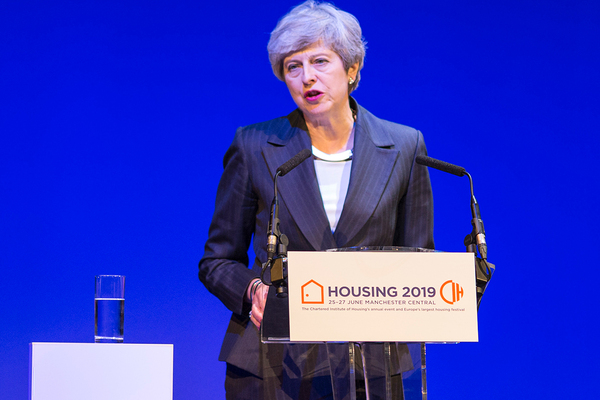You are viewing 1 of your 1 free articles
 Jules Birch
Jules BirchIs this the future for the housing sector?
Three different news stories in the past 24 hours provide a powerful reminder of what could be at stake for housing in the transition from Theresa May to (presumably) Boris Johnson due on Wednesday, writes Jules Birch
The government’s consultation on ending Section 21 ‘no-fault’ evictions was finally published on Sunday along with a proposal to give private renters access to the government’s database of rogue landlords.
But the Sunday Telegraph already had two stories based on thinktank reports due on Monday that put the emphasis firmly back on homeownership.
Conservative thinktank Onward called for cuts in stamp duty with proposals very similar to those put forward by Boris Johnson during the leadership campaign.
And the Conservative Brexiteer-in-chief Jacob Rees-Mogg wrote a pamphlet for the Tory Institute of Economic Affairs (IEA) putting the libertarian case for an end to ‘socialist’ interference in the housing market.
The timing of all three is significant as it provides some indications of what the outgoing regime thought important enough to get out before the other lot take over and what the wider Conservative party thinks might be possible under the new regime.
“The question for private landlords will be whether to lobby for other changes or to concentrate on making the case against abolition to new ministers”
If the first is an example of what Theresa May told the Chartered Institute of Housing conference last month are “our truly radical reforms… in support of those who rent”, the second and third could well signal a return to what she criticised as “the single-minded drive for homeownership” of successive previous governments.
The Section 21 consultation itself proposes the abolition of assured shorthold tenancies (ASTs) combined with changes to assured tenancies and assured periodic tenancies to make it simpler and quicker for landlords to gain possession.
Campaigners for reform have already recognised the need to keep up the pressure given the temptation for the new government to stall progress.
The question for private landlords will be whether to lobby for other changes or to concentrate on making the case against abolition to new ministers.
Although it is focused mainly on the private rented sector, the consultation is also directly relevant to social and supported housing because of the number of housing associations that rely on significant proportions of ASTs.
Allowing tenants to check the rogue landlord database sounds impressive until you start to wonder how few landlords are actually on it – and remember that plans to introduce registration of all landlords and agents were scrapped under the coalition.
The report from Onward calls for stamp duty to be abolished completely for all purchases of a main home worth less than £500,000 and halved for purchases of a main home worth more than £500,000.
Unlike the similar plan put forward by Mr Johnson during the leadership campaign, this one is costed at £3.3bn a year.
“The consultation is also directly relevant to social and supported housing because of the number of housing associations that rely on significant proportions of ASTs”
The thinktank says this could be paid for by stamp duty increases for second homes and investment properties and purchases by companies and foreign buyers as well as increases in council tax and charges on empty property.
However, Onward argues there is “a clear intellectual and moral case” for going further and abolishing stamp duty completely on all main residences at a cost of £5.2 bn a year.
According to the Sunday Telegraph, Mr Johnson is considering the plan but apparently as a way of helping ‘empty nesters’ to downsize.
This scarcely believable added spin is perhaps an indication of his team’s sensitivity to the charge that it is actually a huge tax cut for people who can afford expensive houses.
Mr Johnson has also floated the idea of making the seller rather than the buyer pick up the stamp duty bill.
Mr Rees-Mogg’s IEA pamphlet is far more ideological and comes with no costings at all.
It wants stamp duty to be cut to 2010 levels, an end to taxes on buy-to-let landlords, and cuts in capital gains tax and inheritance tax rates on shares and other assets to the same levels as for residential property.
If all that sounds like a huge tax cut for people like Mr Rees-Mogg, he also attacks the “self-defeating” Help to Buy for making the housing crisis worse.
However, the core of the report is an attack on the “socialist system” that it claims began with the 1947 Town and Country Planning Act.
This has created a ‘Gordian knot’ that makes planning so complicated that only big house builders can take advantage at the same time as it denies local choice and fuels nimbyism.
Proposed solutions include decentralisation of tax to local authorities and a “new Right to Buy” of reverse compulsory purchase orders of public land.
There is a direct challenge to the green belt (which Mr Johnson and past Tory manifestos have promised to protect) with support for proposals to allow development of a million homes in the green belt near stations.
And there is also a call for “freeing the market in beauty” by giving local residents the right to vote on “extend or replace” permitted development rights (for example by increasing the houses) subject to a design code they select.
“As for help for renters, that will come not through things like ending Section 21 but via tax cuts for their landlords and opposition to rent control”
Some of it sounds superficially attractive until you start to consider the potential problems.
Building near stations in the green belt might be a good way to boost supply but it could also be a disaster without careful consideration of the infrastructure around them (in other words, better planning rather than less planning).
And, in case anyone gets the wrong idea, Mr Rees-Mogg adds that he is definitely not talking about allowing Bristol to “devour the Somerset countryside on its southern flank” (aka his constituency).
Meanwhile his claim that “much of our country’s finest housing was created before the late 1940s” (aka before socialism) sounds good when he talks about Georgian terraces and Edwardian mansion blocks.
Strangely, he does not talk about the ribbon development and sprawl created by the free housebuilding market of the 1920s and 1930s that gave rise to those post-war planning controls in the first place and led to the low-density suburbs that we now see as a problem.
As for help for renters, that will come not through things like ending Section 21 but via tax cuts for their landlords and opposition to rent control.
The significance of his pamphlet, though, lies less in its questionable substance than in its call for a return to “the homeownership project of the 1980s” and the timing of its publication in the week of Tory regime change.
If Mr Johnson as prime minister seems almost certain, then a housing policy more focused on homeownership seems highly probable.
As for the merely possible, I’m not sure his pamphlet is a job application but, who knows, in our worst nightmares we could even have housing secretary Mr Rees-Mogg by the end of the week.
Jules Birch, award-winning blogger











